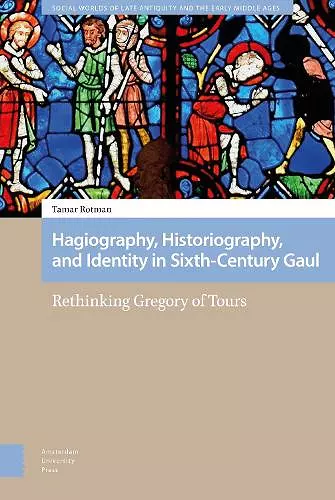Hagiography, Historiography, and Identity in Sixth-Century Gaul
Rethinking Gregory of Tours
Format:Hardback
Publisher:Amsterdam University Press
Published:2nd Dec '21
Currently unavailable, and unfortunately no date known when it will be back

This book explores the hagiographical works of Gregory of Tours, revealing their role in shaping Gallo-Christian identity during the Merovingian period.
In Hagiography, Historiography, and Identity in Sixth-Century Gaul, Gregory of Tours emerges as a pivotal figure in understanding the cultural and religious dynamics of Merovingian Gaul. As a sixth-century bishop, Gregory dedicated two decades to composing extensive works that intertwine hagiography and historiography, offering crucial insights into the social and political landscape of his time. His writings not only document the lives of saints but also reflect the broader identity crisis that followed the fall of the Roman Empire.
The book delves into Gregory's notable hagiographical collections, particularly the Glory of the Martyrs, Glory of the Confessors, and Life of the Fathers. These texts are rich with accounts of saints and their miracles, providing a window into the Mediterranean world and the interconnections between the Merovingians and their counterparts. By analyzing these narratives from both literary and historical angles, the study contextualizes Gregory's work within the evolving identity of Gallo-Christian society.
Through this examination, the author presents groundbreaking conclusions about Gregory's intent in crafting these hagiographies. The study posits that these narratives served as a form of ecclesiastical history, aimed at establishing a distinct Gallo-Christian identity for his audience. Ultimately, Hagiography, Historiography, and Identity in Sixth-Century Gaul offers a nuanced understanding of how Gregory's writings shaped the religious and cultural identity of his era.
"[...] this is a readable and rather enjoyable book which does indeed succeed in getting us to think about Gregory afresh."
- Paul Fouracre, The Medieval Review, June 2022
"[...] there is much to commend in Rotman’s innovations and nuanced reassessments; they should help instruct how scholars may better approach the corpus of the bishop of Tours henceforth."
- Allen E. Jones, Journal of Early Christian Studies, Vol. 30, No. 3
''Hagiography, historiography, and Gregory of Tours are all subjects that have attracted a good deal of attention since 1960: the concept of identity has come to the fore rather more recently, above all since 2000. Tamar Rotman has something to add to the four areas of discussion.''
- Ian Wood, University of Leeds, Early Medieval Europe, 2023, Vol. 31, No. 2
"Rotman’s study performs a vital service in demonstrating that Gregory’s second great literary project was no less deliberate and profound than the Historiae. For this reason, and for its many insights into the connections between Merovingian Francia and the wider Mediterranean, it is necessary reading for all scholars of Gregory and his milieu."
- Gregory Halfond, Speculum, vol 98, no 3, July 2023
''Rotman’s book is both interesting and challenging. Its argument is innovative and carefully crafted, directing our attention to problematic and unexplained elements in Gregory’s oeuvre and signaling assumptions about genre and categorization that historians can unwittingly bring to the table.''
- Isabel Moreira, Studies in Late Antiquity, Winter 2023
''...Rotman’s book opens the door to further developments in scholarship on Gregory and the role of hagiography in historical study''.
-Erica Buchberger, Church History Journal , June 2023
ISBN: 9789463727730
Dimensions: unknown
Weight: unknown
196 pages